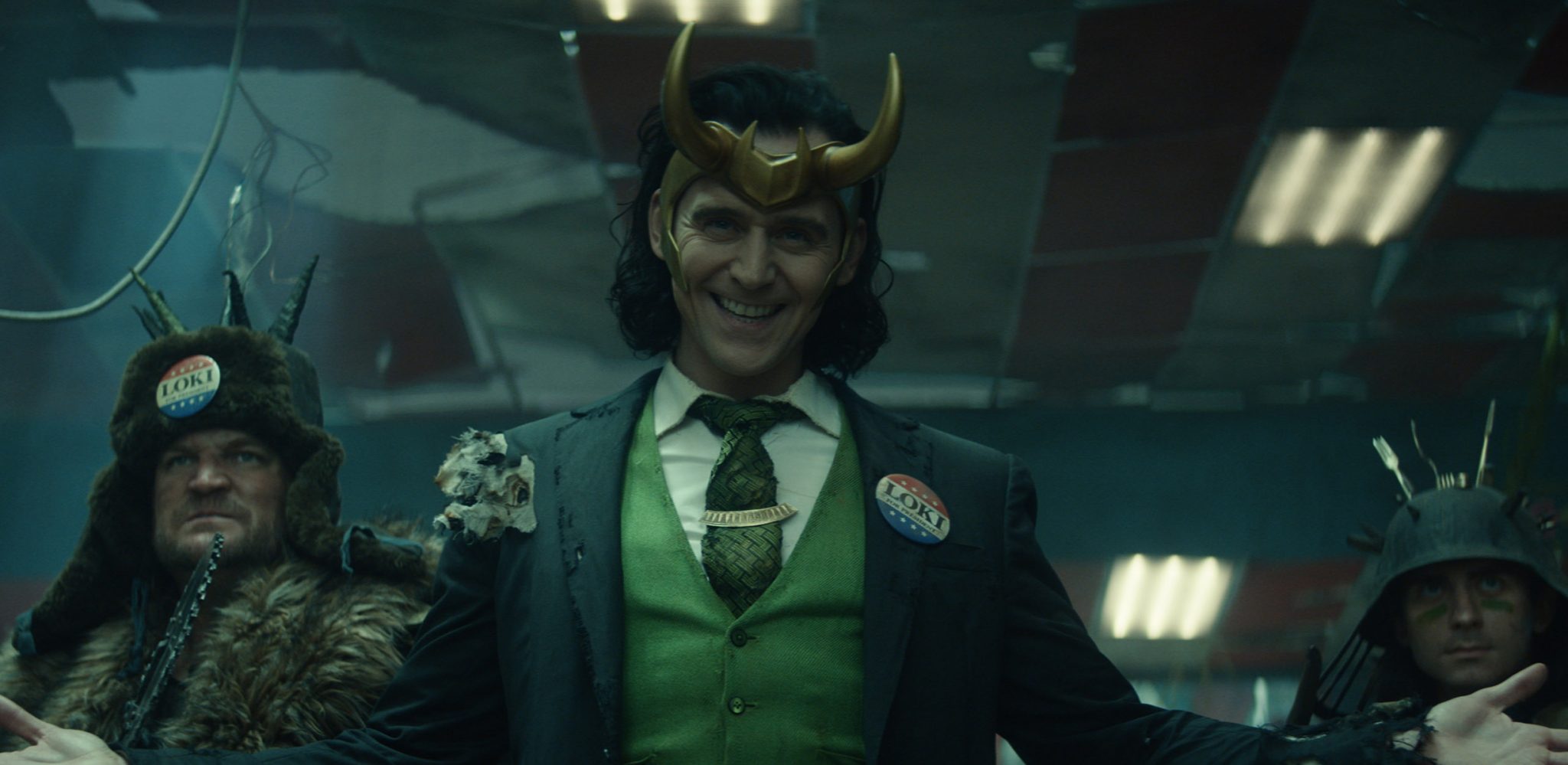The Marvel Cinematic Universe’s introduction of the ‘multiverse’ as a new plot device sets it on course to achieve its glorious purpose of conquering all media
The recently concluded Disney+ series Loki (2021) may be taken as a sort of confirmation of the ‘late style’ of the Marvel Cinematic Universe: a media franchise spanning film, TV and videogames that has become preoccupied with its own past and now revels, with sour bemusement, in dissonance, disunity and dissatisfaction. At the same time, Loki gestures towards the possibility of new narrative terrain. Like the Disney+ shows WandaVision (2021) and The Falcon and the Winter Soldier (2021) before it, Loki takes an underdeveloped plot spur from previous Marvel Studios films and runs with it: this time its subject is a version of the Asgardian god of mischief Loki (Tom Hiddleston), who, having grabbed a loose Cosmic Cube (a MacGuffin of incomprehensible power), has ducked out of the Marvel Cinematic Universe’s plot prior to the character’s redemption in the film Thor: Ragnarok (2017) and later death in Avengers: Infinity War (2018).
As we see in Loki, however, Loki’s escape from his destiny is short-lived; he is immediately apprehended by the Time Variance Authority, summarily tried and convicted as a ‘variant’ against the ‘Sacred Timeline,’ and scheduled for ‘pruning’ (a grotesque method of execution that sees variants burned out of existence, from the inside out). He is, however, spared and instead enlisted as a police informant tasked with assisting an operation to bring down a time criminal who has been ambushing TVA agents up and down the timeline. The criminal, it turns out, is another variant of Loki. The timeline, indeed, is lousy with Lokis and their chaotic trickster nature gives them an uncanny knack for escaping pruning, as well as what amounts to an instinctive refusal of the TVA’s quest to impose an artificial and unbending universal order on the universe. Indeed, our Loki too soon finds himself on the run from the TVA, this time joined by a (female) variant of himself, who calls herself Sylvie (Sophia Di Martino), and to whom he feels uncomfortably drawn.
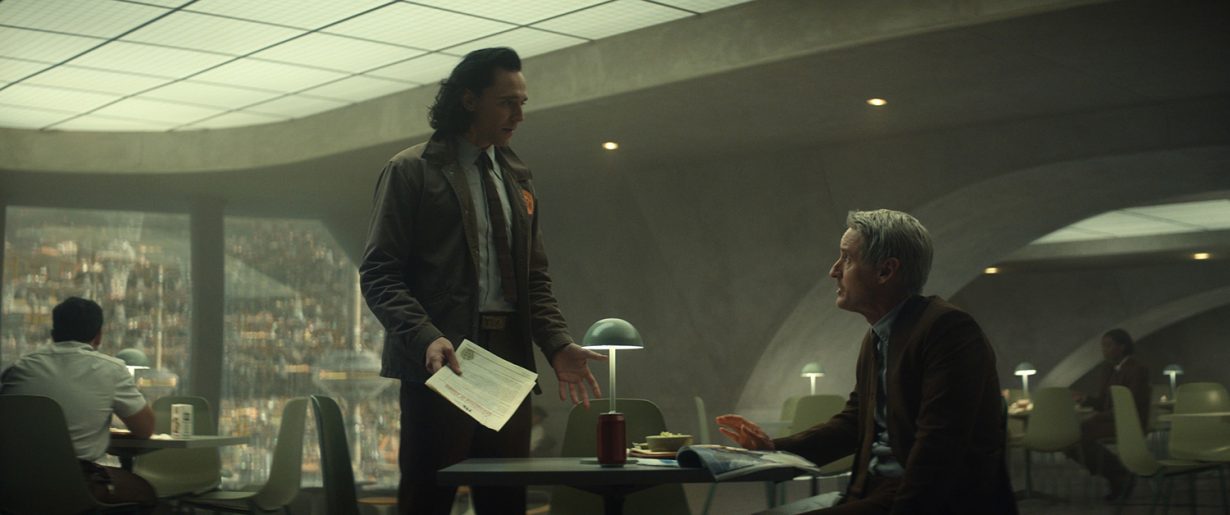
The idea of a totalitarian theocracy relentlessly weeding out all deviation and difference – and one that is especially fixated on Loki, who is the Marvel films’ first queer lead character (revealed as bisexual in episode 3 of Loki) – gives the series a resonance with the contemporary LGBT civil rights struggle, as some have noted. Outside that political allegory, Loki’s storyworld also speaks metaphorically to the tight control of the Disney Corporation over not just the Marvel franchise but over American popular culture more generally; the top six highest-grossing films of 2019, the last year before the pandemic disrupted the industry, were all Disney movies.
From this perspective we might see the TVA as a metaphor for the way the culture industry crushes variation and polyvocality (as with 2008’s WALL-E, Disney is once again successfully selling a critique of its own profit-seeking practices to a global marketplace eager to purchase it). It can’t be lost on us that the TVA’s primary weapon is the ‘retcon’: the ability to painlessly undo the consequences of any event to reset the story back on its predetermined track – the ultimate weapon of any franchise showrunner and one that Marvel Studios has never been slow to deploy. In such a reading the variant Lokis simultaneously represent both generative chaos and creative autonomy, which the monopolistic TVA/Disney brutally represses into a single overarching narrative (which has already fully run its course from villainy to regret to redemption to death).
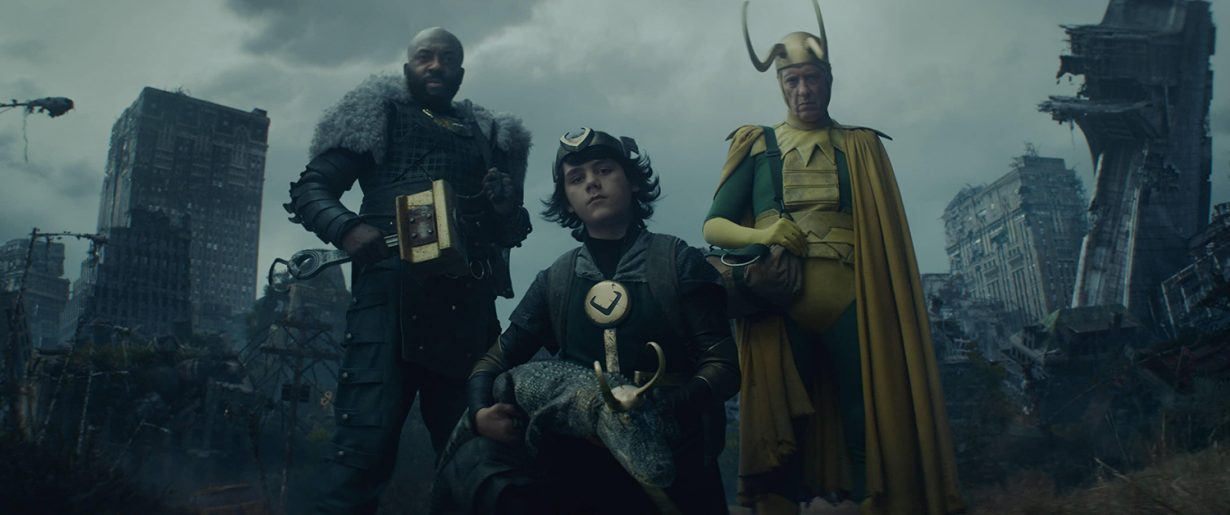
The last episode of Loki makes this allegory for Disney’s market power explicit (while also complicating the metaphor significantly) when we meet He Who Remains, the founder of the TVA (with Jonathan Majors playing the mad, broken god). He Who Remains is an amalgam of several characters from the original Marvel comics; he most directly resembles a character called Immortus, a time traveler from the thirty-first century who has devoted himself to his own survival and perpetuation, not least of all against his own variants (like ‘Kang the Conqueror’, rumoured to be played by Majors in the upcoming Marvel film Ant-Man and the Wasp: Quantumania, 2023). In Loki, He Who Remains is triumphant but tired, bored, and yearning for death; he claims he is the last survivor of an endless war of different variants of himself, from across the multiverse, and has tasked the TVA to relentlessly prune difference in order to prevent the emergence of any other version of himself that might threaten the peace.
He Who Remains boasts that he is the orchestrator of everything that anyone in the Sacred Timeline has ever experienced. He claims to be, that is, the author of the entire Marvel Cinematic Universe thus far, which he has personally selected and nurtured against all the other possible Marvel Cinematic Universes that might have existed in order to achieve a moment of final decision, in which the Lokis can choose either to take his place at the top or else destroy the TVA, plunging the universe back into multiversal chaos. Every last moment of comedy and pathos since 2008’s Iron Man, every triumph and despair, has thus been orchestrated by a single puppet master for his own callous purposes – making He Who Remains the most hyperbolic allegory for the Marvel franchise-mastermind Kevin Feige yet depicted on screen. Only now is He Who Remains returning the possibility of free will to the universe he has stultified. Sylvie chooses chaos, and brings back the multiverse; Loki finds himself dumped inside a creepily altered timeline where he is apparently completely anonymous, and perhaps doesn’t exist at all. A second season, of course, has already been greenlit.
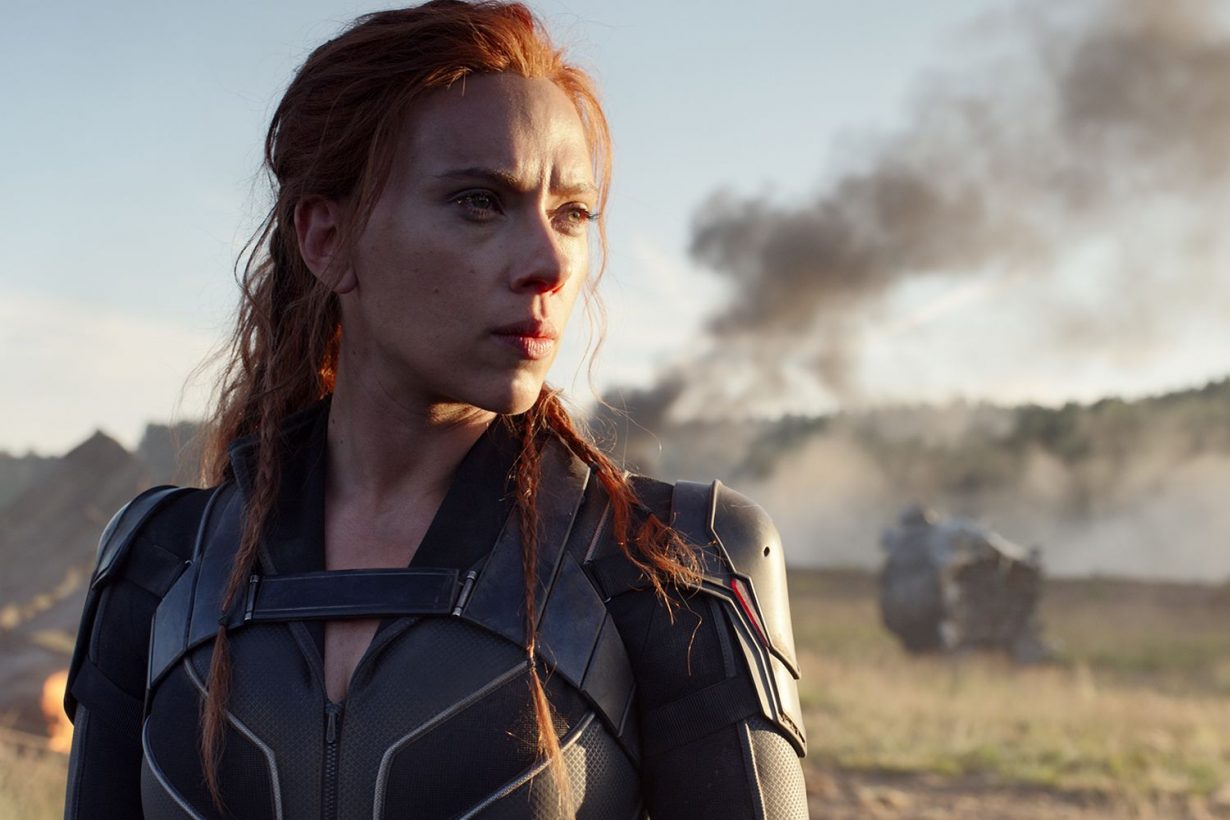
The season finale of Loki coincides with Marvel’s recent release of the anemic, running-on-fumes Black Widow – featuring Scarlett Johansson as the eponymous assassin in a film whose entire storyline is crammed into the gap between two scenes near the end of Captain America: Civil War (2016), and whose huge second-week drop-off has both the theatre industry and Disney itself reeling. The two together mark what would seem to be a final closing of the door on the first act of the Marvel Cinematic Universe, which had culminated in the Avengers: Endgame (2019) mega-event. (If there were any doubt, the once all-powerful Infinity Stones are reduced to a running joke in Loki; the TVA uses them as paperweights.)
Certainly He Who Remains/Immortus/Kang risks becoming a dull retread of the villainous Thanos (with the promise of yet another identical Big Fight Scene) but Majors’ darkly fascinating performance as a very different sort of Big Bad suggests this is all going someplace else. Loki itself has not yet made any sort of definitive statement on whether Loki or Sylvie was right; the TVA’s jackbooted thugs and the prospect of a destructive multiversal war both seem, well, bad, though the prospect of bringing in the X-Men, the Fantastic Four, and canonical tie-ins with earlier iterations of the Spider-Man franchise would probably cause most fans to lean more on the ‘chaos’ side of things. There hasn’t been a sense yet that the MCU can get ‘too big’ – and that steep drop-off for Black Widow’s second week and the ‘and the rest’ buzz around Marvel’s Shang-Chi and Eternals films coming later this year suggests there may soon be a desire to bring in some heavy hitters to juice a franchise that is beginning to feel a bit played out.
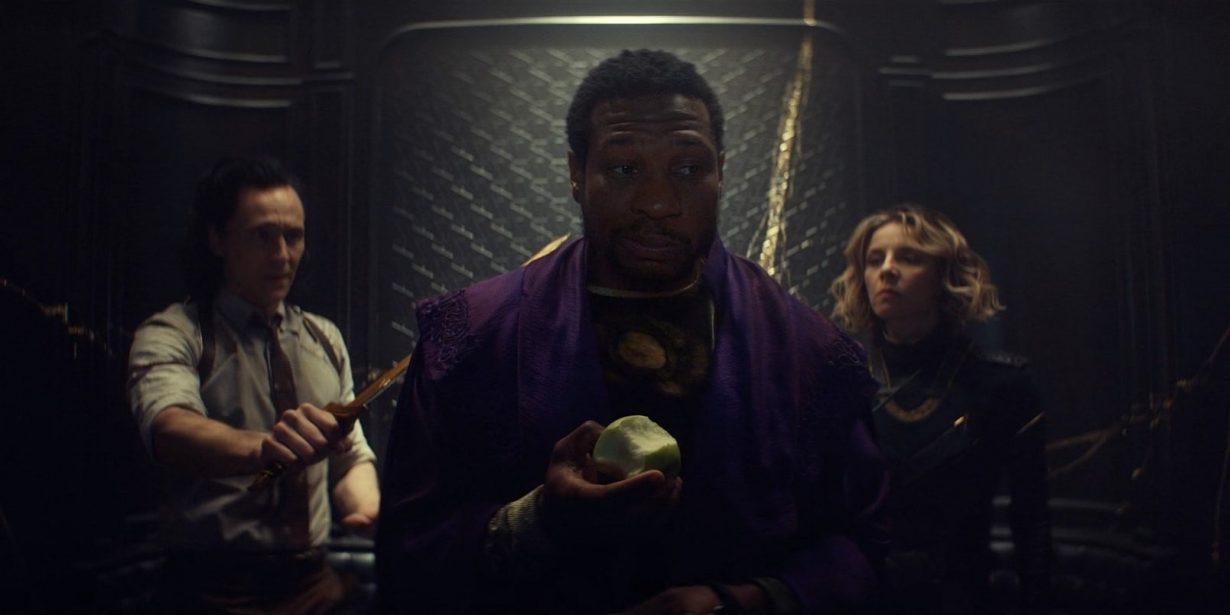
Just as the expansion to the Disney+ streaming platform makes possible the monetisation of different special-effects budgets and narrative scales (allowing Marvel to command yet another slice of your attention), Loki’s introduction of the multiverse means that the Marvel Cinematic Universe is no longer bound even by the logic of intellectual-property rights and multi-picture deals that up to now had structured its grand design. Any Marvel property, in any medium, is now at least conceivably canonical with the storyline of its film franchise; any character can potentially be resurrected or recast at any time, or meet alternative versions of themselves, as we spiral towards whatever cinematic mega-event the Multiversal War is building towards. A multiverse filled with less-expensive versions of your signature protagonists is a pretty nice trick for a company currently being sued by multiple A-list actors for breaking its contracts.
As a formal device, the multiverse undoubtedly carries with itself certain grave risks, chief among them story cohesion, oversaturation, and the total diminishment of narrative stakes (if everything happens somewhere, does anything really matter?) but if the Marvel Cinematic Universe is to achieve its glorious purpose of conquering all media, the multiverse was bound to happen sometime. Indeed, of all the strategies Marvel might have chosen for heightening its storyworld, returning to the comics’ grounding in the multiverse may be the only one that can help it cut through the mood of debilitating grief that has overwhelmed its recent offerings. Now we move on: to spectacle without consequence, to death without sadness, to franchise expansion without limit or end.
Gerry Canavan is associate professor of English at Marquette University.
